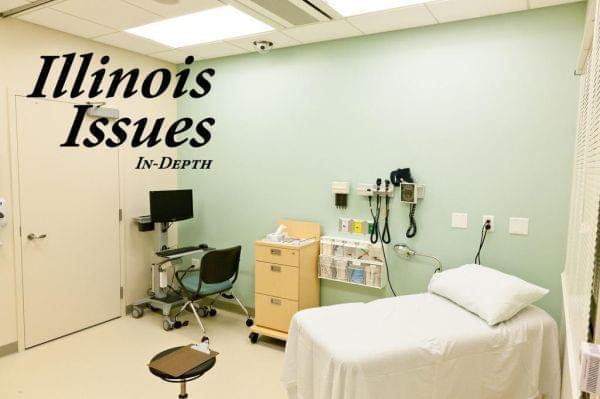Illinois Issues: More Nurses To Help Sexual Assault Survivors

Stanford Edtech/Flickr/CC BY 2.0
A measure the General Assembly is considering aims to increase the number of nurses trained to see victims of sexual assault. Supporters say the shortage of trained nurses means many survivors are treated poorly in the medical system.
The proposed measure would increase the number of Sexual Assault Nurse Examiners (SANEs) across the state within the next four years by 50 percent. It would also call for a maximum 90-minute waiting period for survivors who arrive at a treatment center and would also outline specialized care for pediatric victims.
Just over four years ago, Lindsey Ross was sexually assaulted and went through a rape kit examination at a hospital outside of Chicago. Ross says she does not believe the nurse completing her kit had been trained to handle sexual assault cases, and said her experience "absolutely" would have been different had she been seen by a SANE.
"I can't imagine you'd see a whole lot of survivors and still be rough. And just generally mean, really," she said.
At the hospital, Ross said, she was bombarded with questions from hospital staff and local authorities that she did feel able yet to answer about her assault, and it only got worse when the nurse began the exam.
"So the nurse finally comes in and she ... How do I phrase it. She was not very empathetic. She was ...very rough," Ross said.
Ross said when she told the nurse that something hurt or was uncomfortable, the nurse responded, "No, it doesn't hurt" or "No, it's not cold."
She described the nurse as not being gentle enough with her body and her emotions, making it even harder to undergo the exam. Having a SANE present, she believes not only would she have been more comfortable with the whole process, but the detectives on site would have, too.
"The detectives, they … didn't really want to deal with it in the first place," Ross said. "But I would think that they would have been in the hospital with someone that had more experience and more training in it, they would have been more understanding of what was going on."
Polly Poskin, executive director of the Illinois Coalition Against Sexual Assault, says her organization strongly supports the measure.
"We think it's critical and incumbent upon hospitals to provide this expertise," Poskin said. "We have trauma centers, we have the ability for a cardiologist to respond to emergency departments in specialized cases, and rape is a specialized case."
As of now, sexual assault victims were treated the same, regardless of age. Dr Channing Petrak with the Pediatric Resource Center in Peoria says it is important to recognize the difference in need for care of a child versus an adult victim.

Polly Poskin is the executive director of the Illinois Coalition Against Sexual Assault.
"It's like any procedure, you want someone who is competent to do that exam for you," Petrak said. "So, this bill will allow people to have their child transferred to someone who has competency, or to go to a center where someone can do that exam under very child-friendly circumstances in a child-friendly setting with someone who has training."
SANE training involves 40 hours of classroom instruction followed by appropriate clinical experience. Nurses can undergo specialized training such as in the case of pediatric assault, which takes additional time.
The state provides evidence testing in two areas, Forensic Biology and DNA. According to Illinois State Police records, Forensic Biology received over 2,700 rape kits for testing in 2017. Despite testing nearly 2,500 kits that year, there was more than 1,500-kit backlog by the end of December.
Former Gov. Pat Quinn signed into law in 2010 a measure that requires police to submit all DNA evidence from sex crimes to the Illinois State Police crime lab within 10 days of collecting it. The lab then has six months to analyze the kits, but only "if sufficient staffing and resources are available."
Still, Poskin says the evidence gathering and testing for use in possible prosecution is important.
"This isn't just some minor altercation of which somebody has a simple injury and reports to the emergency department to be assisted," Poskin said. "We need the hospital personnel to have the specialized training to make that the best evidence collection and the best opportunity for the prosecutor in a trial."
A statement from Illinois Attorney General Lisa Madigan says that the office "has provided classroom training to more than 1,500 clinicians across the state, yet only 300 of those nurses have completed the clinical training required to become a practicing SANE."
Mary Morrisey, Madigan's deputy chief of staff, says part of the reason nurses do not complete clinicals is because of the "lack of support that they get within their home institutions."
The Illinois Health and Hospital Association supports the objectives of the measure. But David Gross, senior vice president of government relations for the organization, pointed out that today's nurses move work locations frequently, and that ER nurses in particular have high turnover rates. Even with the 90-minute window allowing hospitals to share SANEs, meeting the staffing mandate and training for an estimated 650 SANEs by 2022 is a concern.
"About 80 percent of the nurses that start the classroom training don't finish the clinical training," Gross said. "So, adding in the substantial emotional toll and burnout that SANEs experience, the turnover of SANEs could be even higher."
The measure would also add burdens on some hospitals across the state with already tight budgets, Gross said.
Three months after undergoing testing for a rape kit, Lindsey Ross was told her case was being dropped. A representative from the State Attorney's office told her there was not enough evidence - despite Ross pointing out her alleged rapist from a lineup - and handed her the sealed rape kit.
"When they told me they weren't pursuing it, I was angry, to say the very least. And I fought to have them continue, but they wouldn't," she said.
While the measure could mean more evidence is collected in the first place, work is underway by those who also want to tackle the growing backlog.

The Illinois Senate passed the measure on Friday, but with an amendment to the version that passed the House. That means the House will have to vote on the bill again with the Senate’s changes.
Illinois Issues is in-depth reporting and analysis that takes you beyond the headlines to provide a deeper understanding of our state. Illinois Issues is produced by NPR Illinois in Springfield.
Links
- Illinois Issues: Advocates Argue For Sealing Eviction Filings
- Illinois Issues: Outside The Big Box - Repurposing Vacant Space In Illinois
- Illinois Issues: Which Take On Taxes Lowers Them For Voters?
- Illinois Issues: Gubernatorial Candidates Have Fence-Mending Ahead
- Illinois Issues: What’s On Tap For The State’s Big Birthday Party?
- Illinois Issues: On Y-Block Plans, Governor At Odds With Local Businesses
- Illinois Issues: Is Illinois Ready For A Retail Shift?
- Illinois Issues: Money And The Legal Weed Debate
- Illinois Issues: Madigan’s #MeToo Problem
- Illinois Issues: Fight Or Flight — Attorney General Candidates On Impasse Politics
- Illinois Issues: Illinois’ Storied History Of Choosing Its Second-In-Command
- Illinois Issues: Women Rising - The Push For Gender Parity In State Government

